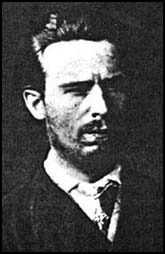Catechism of a Revolutionary: Difference between revisions
| Line 9: | Line 9: | ||
==See also== |
==See also== |
||
* [[Anarchism and violence]] |
* [[Anarchism and violence]] |
||
* [[Professional |
* [[Professional Revolutionary]] |
||
* ''[[The Possessed (novel)|The Possessed]]'', an 1872 novel by [[Fyodor Dostoevsky]] influenced by the events surrounding the publication of the ''Catechism''. |
* ''[[The Possessed (novel)|The Possessed]]'', an 1872 novel by [[Fyodor Dostoevsky]] influenced by the events surrounding the publication of the ''Catechism''. |
||
Revision as of 09:03, 12 August 2008

The Revolutionary Catechism or Catechism of a Revolutionary is a manifesto written by Russian anarchists Mikhail Bakunin and Sergey Nechayev between April and August 1869. In the work, Nechayev called for total devotion to a revolutionary lifestyle.[1] Its publication in the Government Herald in July 1871 as the manifesto Narodnaya Volya secret society of the was one of the most dramatic events of Nechayev's revolutionary life,[2][3][4] through its words and the actions it inspired establishing Nechayev's importance for the Nihilist movement.[5] The Catechism is divided into two sections; General Rules of the Organisation and Rules of Conduct of Revolutionaries, 22 and 26 paragraphs long respectively;[3] abridged versions were published as excerpts in the anarchist periodicals Die Freiheit and The Alarm.[6]
The most radical document of its age,[7] the Catechism outlined the authors' revolutionary Jacobin program of organisation and discipline, a program that became the backbone of the radical movement in Russia. The revolutionary is portrayed in the Catechism an amoral avenging angel, an expendable resource in the service of the revolution,[5] committed to any crime or treachery necessary to effect the downfall of the prevailing order.[3]
The revolutionary is a doomed man. He has no personal interests, no affairs, no sentiments, attachments, property, not even a name of his own. Everything in him is absorbed by one exclusive interest, one thought, one passion — the revolution.
— Catechism of a Revolutionary, opening lines.[6]
Critics of anarchism cite the Catechism as the most notorious document in what they take to be the anarchist tradition, arguing that it reflects the innately violent and nihilistic nature of the philosophy.[8] Scholar Michael Allen Gillespie has hailed the Catechism as "a pre-eminent expression of the doctrine of freedom and negation" that arose in the Fichtean notion of the "Absolute I" that had been concealed in Left Hegelianism.[5] Prominent Black Panther of the 20th century Eldridge Cleaver adopted the Catechism as a "revolutionary bible", incorporating it into his daily life to the extent that he employed, in his words, "tactics of ruthlessness in my dealings with everyone with whom I came into contact".[9] The ideas and sentiments in the work had been in part previously aired by Zaichnevsky and Ishutin in Russia, and by Carbonari and Young Italy in the West.[10]
See also
- Anarchism and violence
- Professional Revolutionary
- The Possessed, an 1872 novel by Fyodor Dostoevsky influenced by the events surrounding the publication of the Catechism.
Footnotes
- ^ Wesson, Robert (1978). Lenin's Legacy. Stanford: Hoover Institution Press, Stanford University. pp. p.9. ISBN 0817969225.
{{cite book}}:|pages=has extra text (help) - ^ Heller, Mikhail (1988). Cogs in the Wheel. New York: Knopf. pp. p.12. ISBN 0394569261.
The Catechism of a Revolutionary, a chilling blueprint for the ideal "New Man," was the manifesto of a secret society called The People's Revenge (Narodnaya Volya)...
{{cite book}}:|pages=has extra text (help) - ^ a b c Avrich p.38
- ^ Crenshaw, Martha (1995). Terrorism in Context. University Park: Pennsylvania State University Press. pp. p.72. ISBN 0271010150.
{{cite book}}:|pages=has extra text (help) - ^ a b c Gillespie, Michael (1995). Nihilism before Nietzsche. Chicago: University of Chicago Press. pp. p.162–163. ISBN 0226293475.
{{cite book}}:|pages=has extra text (help) - ^ a b Avrich, Paul (1986). The Haymarket Tragedy. Princeton: Princeton University Press. pp. p.171. ISBN 0691006008.
{{cite book}}:|pages=has extra text (help) - ^ Moser, Charles (1992). The Cambridge History of Russian Literature. Cambridge: Cambridge University Press. pp. p.265. ISBN 0521425670.
{{cite book}}:|pages=has extra text (help) - ^ Mclaughlin, Paul (2007). Anarchism and Authority. Aldershot: Ashgate. pp. p.7. ISBN 0754661962.
{{cite book}}:|pages=has extra text (help) - ^ Avrich p.13
- ^ Avrich, p.37
References
- Avrich, Paul (1990). Anarchist Portraits. Princeton: Princeton University Press. ISBN 0691006091.
